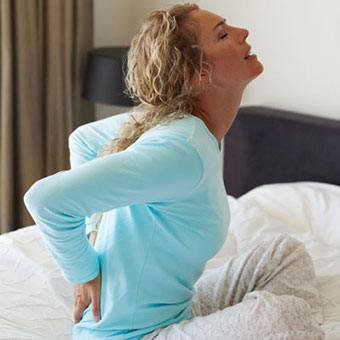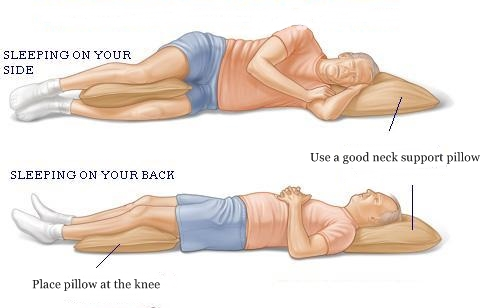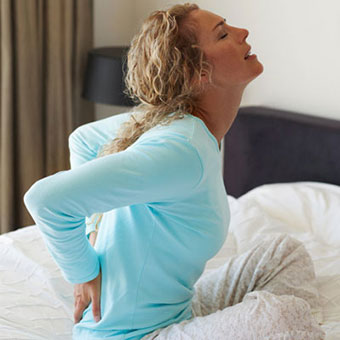Waking up with back pain is rarely a serious problem. Even many people who are more or less pain free during the day still experience pain in the nights and while getting up.
 Recent research reveals that nearly one in three people experience back pain after a night’s sleep, No one really understands the reason for morning stiffness. Presumably, while the body is inactive, fluid leaks out from the small blood vessels and capillaries and the tissues become “waterlogged.” Then, if you try to move the part, the swollen tissues feel stiff until the motion pumps the fluid out through the lymph channels and the veins while most feel stiff or ache.
Recent research reveals that nearly one in three people experience back pain after a night’s sleep, No one really understands the reason for morning stiffness. Presumably, while the body is inactive, fluid leaks out from the small blood vessels and capillaries and the tissues become “waterlogged.” Then, if you try to move the part, the swollen tissues feel stiff until the motion pumps the fluid out through the lymph channels and the veins while most feel stiff or ache.
The average episode of morning stiffness lasts only about 10 to 15 minutes. The stiffness goes away as you move and warm up the joints and muscles. However, stiffness from rheumatoid arthritis may last more than an hour.
People often say, “I’m just getting old,” but old age alone does not cause morning joint stiffness. It is usually an indication of worn joints, muscle tightness, or inflammation from arthritis.When your lower back is stiff in the morning, muscles such as psoas, gluteus and hamstrings become tight overnight. This generates pressure on the joints resulting in pain. Weak abdominals also contribute to this pain as they do not allow adequate support for the lumbar spine
As your joints get older, the spongy cushion of cartilage begins to dry out and stiffen. The joint lining also produces less synovial fluid, which lubricates the joint. Weak muscles and stiff tendons also tend to tighten during sleep. Osteoarthritis, (the “wear and tear” kind), and rheumatoid arthritis, (which involves swelling and inflammation), both can trigger morning stiffness.
In some of the case, spinal morning stiffness is associated with lumbar disc disorder . The associations increases when we combined spinal morning stiffness with low back pain.
There are various causes and contributing factors for morning stiffness, and some of them are –
• Overweight and poor diet
• Too much exposure in a cold environment
• Poor posture while sleeping .
No question that the sleep surface can influence force into the soft tissues. If you don’t believe , try sleeping one night on the kitchen floor and you’ll realize it.
Remedies of morning stiffness
• Regular exercise
• Avoid stomach sleeping.
•Sleep position- Place a plush, supportive pillow underneath your knees, if you sleep on your back. This action flattens your back, removing a large arch from your lower back region. It can relieve pain in just a few minutes. If you are a back and side sleeper, you can use a supportive pillow and pull it under your knees or between your legs as you switch positions.
•You can also place a small, rolled-up towel under the small of your back for extra support. You need a firm mattress (not too soft / not too hard). Your bed should form to the shape of your body
• Stretching and sitting up while in bed.- Think of stretching in the morning as you warm up for the entire day. These stretches are meant to lightly ease the body into movement, and upon completion, leave you feeling more awake and ready to get on with your day.
• Stretching in the morning will ease stiffness, soreness, and can help diminish chronic aches and pains in the body. Take time for yourself in the morning with yoga poses if you know, so you can be sure to enjoy the rest of the day!
•Drink enough water -. Make sure you’re well hydrated. This might seem obvious as soft tissues need water to remain as pliable as possible.
• Healthy diet
• Hot shower
•Learn techniques for stress management – Learning stress management techniques can assist you to sleep comfortably
•Supplements : You cannot reverse the effects of joint aging, and while certain medications can help manage arthritis pain and inflammation, stiffness can still occur.. Maintaining a healthy weight also can help. Finally, don’t be swayed by joint health supplements, such as glucosamine or chondroitin.. This is controversial because there have been studies that suggest Glucosamine and Chondroitin Sulfate don’t work for arthritic joints even though is chondroitin Sulfate is a disease modifying agent for osteoarthritis. It slows the progression of the disease and deterioration of the joint cartilage.
• Avoid painkillers, they don’t help morning stiffness.
